There may be spoilers... but I don't believe this film can ever be ruined by spoilers.
Director: Jacques Tati
Screenplay: Jacques Tati and Jacques Lagrange
Starring: Lots of people!
Images from the 2006 Criterion Collection release.
I think Jacques Tati's Playtime comes as close to Pure Cinema as any Alfred Hitchcock thriller does, but unlike the Master of Suspense, Tati does not use his abilities to tell a story. There are little scenarios, of course, but they are more akin to Charlie Chaplin's silent shorts than to Vertigo, for instance. Playtime is a film where I can watch the scenes in any order and they still work. Or I can start watching in the middle and still become engaged. I like to think of the film as an anthology of short films or episodes, each location populated by familiar faces that skirt around the edges and only occasionally come to center stage.
I have heard of it being called inaccessible and difficult, but I think the problem is that people are so used to having a story, it comes as a bit of a shock to have virtually no story and no main characters. Tati wanted to reduce the role of the star, almost to that of an extra. That is, everyone, including his beloved Monsieur Hulot is leveled to an even playing field in his fictitious Paris. If we come to terms with this radical difference and let images come to us rather than seek them out, Playtime changes from a difficult puzzle that requires lots of work, to play, as the title suggests. I don't see Playtime as a puzzle that needs to be solved, but rather a playground that my mind is free to wander through and explore the space of the frame.
One of the things that Playtime doesn't do is move the camera very much. Very often, it will just hold a long take bustling with activity. Unlike the films of Hitchcock, the shots themselves tend to be objective and do not tell the viewer what he or she should be looking at. Instead, the viewer will stare blankly at the screen until... eureka! Something is pinpointed as interesting. For me, this shooting style (almost akin to Kurosawa's Ran now that I think about it) is absolutely necessary for the tone of Playtime and one of its most understandable techniques.
For instance, the opening shots almost feel like we're in a hospital, with the nuns, the sterile environment, and the dialogue between man and wife that is really misleading (in fact, I feel the best way to watch the film is without the subtitles). Only slowly is it revealed that we are at an airport.
In this shot, a dog is wimpering and I instantly tried to pinpoint it. After a while, I realized it was coming from the old woman's bag, as Barbara's gaze drew us to it.
Alienation in the Age of Modernity
The easiest and most apparent theme to pinpoint in Playtime is the sense of social alienation in the age of modernity. Tati expresses these notions through vast interiors that generate distance from person to person.
That's Mr. Hulot waiting to meet with the businessman walking in a wonderful deep focus shot that stretches the wait to an eternity. To be honest, I still don't know the name of the character Hulot is trying to meet, what they're meeting for, or why. The fact that it doesn't really matter proves just how unimportant story is in this case, because it makes their situation in no way less engaging or amusing.
The central motifs for alienation, I think, are the innumerable plate glass windows that line virtually every wall. There is a moment where the businessman thinks he sees Mr. Hulot out in the street, runs towards him, and crashes his nose into a window. Another one that I like even more because it's not pointed at as explicitly is where Mr. Hulot thinks he sees the businessman when he's actually looking at a reflection:
I actually missed this for the first minute or so it was playing and then I suddenly got that eureka! moment and understood what was so funny. It is paramount that Playtime rarely uses music, particularly as a means of reaching a point or catering to the audience's comprehension. What Tati wanted to do with Playtime is to convey that humor is something universal. Nobody, I think, is expected to get every joke, but there is something special about discovering it for yourself rather than have musical cues telling you when to laugh.
Playtime is entirely filmed on one gigantic set, a city dubbed Tativille. I think there are two reasons for this, which embody the two most important ideas I take away from Playtime. The first is the idea of alienation in the modern world. Here, we are presented with a near black-and-white Paris of skyscrapers, displaying only slight remnants of the Paris we know.
These images are perhaps the darkest Playtime will get. In a way, this is the more fully fleshed out vision of a city that Tati hinted at in Mon Oncle, where we were still given the balanced dichotomy of old tradition and new modernity.
Playtime acknowledges that there is no such thing as repetition, only insistence, with its use of wonderful props. The chairs, for instance, make whooshing sounds when they are sat in, and Tati makes sure we know of it.
Little details like the chairs support the most valuable idea I personally take away from Playtime. The idea is: Even in the most mundane, sterile, and seemingly boring of worlds, there are delights, or playtimes, to be had. To me, this idea is much more important than that of alienation and loss of culture because it's not so apparent. The other themes I've seen before in countless science fiction films and even films like The Apartment (alienation) and Burden of Dreams (loss of culture).
I certainly enjoy bleak films of our future like Brazil or Blade Runner, because they ask us to question our place and purpose in the world. Are we required to make order out of everything? And if so, what are the possible repercussions? I would not say, however, that I enjoy things that are overtly bleak and pessimistic to the point of no return. That is, while I enjoy thinking about the dangers... I like a film to acknowledge the silver lining to anything.
That silver lining is the humor (and the heart) of Playtime. Little details, I think, make a film elevated to something special. I've acknowledged this before in films like Roman Holiday and Three Colors: Blue, White, and Red. For me, details are what make life special, and they should be noticed rather than ignored. Like when Mr. Hulot gets on the bus, you'll notice he is kind enough to see that the man's lamp post is not something he should hang onto. But when the bus drives away, he lives up to his kindness by holding it in place:
Tourism: The Other Central Motif of Playtime
These notions of looking at the world in a new light are symbolized by the idea of tourism, more than anything else. Playtime opens and closes at the airport, and much like the vacation aspect of Roman Holiday, Playtime is a delightful escape into a clean and new world. The viewers are the tourists, and Tati emphasizes this through the tour group, which forms the connective tissue throughout Playtime.
Whenever I go to a new city, I feel like everything I look at has a kind of magic to it. For instance, visiting New York City is exciting because it's so different from any other city. Things that are quotidian to New Yorkers like riding the subway, walking through Greenwich Village, or seeing iconic buildings become an adventure for me. I almost want to go up to someone who lives there and say: "Wow, I can't believe you live here!" Then I realize that they would probably say something like: "Wow, I can't believe you live so close to the mountains!" if they visited Colorado. There is something about living in your city that seems to turn you off from what makes it great and exciting for tourists, and it's a bit sad when we can't seem to look at our own city in awe.
Consider this brief, yet magical shot, where the tour bus passes a building, and on cue, the building lights up before the tourist's eyes.
I feel that anyone living in Tati's Paris wouldn't have even noticed. A simple building lighting up is so commonplace to them that they never would've imagined how wonderful it can be to a group of tourists.
This brings me to the second reason that Playtime is completely shot on a set. It seems Tati wanted to ensure that the world we see on the screen is completely novel to audiences. That is, regardless of whether it is sterile or black-and-white, it's a Paris that has never been seen before. Because of this, everyone watching Playtime is a tourist. The film is so engaging and fresh because it's new and unexpected. What this proves, I think, is that tourism need not be confined to going to iconic locations and "seeing the sights." Just walking along the street, riding from the airport, or looking at something that is commonplace to the residents is enough.
Unlike Hitchcock's form of Pure Cinema, Playtime does not manipulate the camera to point the viewer in a certain direction. Instead, it will hold a shot for a while, then cut to a new one. These different perspectives are another ingenious way of showing how delightful it can be to look at something as simple as a family watching television:
And then a cut to here:
Now the two rooms look like one, and it looks like they are all having a conversation together. The genius of a cut like this is that it is completely visual. There are no sound cues to signal the observation being made. And of course, the scene is finished off with a drive-by of the omnipresent tour bus:
I find the best films about escape, such as The Purple Rose of Cairo and Roman Holiday, convey the joys of fiction/fantasy/vacations while not neglecting the realities. Playtime is among these, and in one of my favorite shots, we see a fresh set of tourists ready for a night on the town, while a tired, withered group is ready for a night of rest.
What's so great about this shot? I'll leave it to you to see ;).
Some of my favorite gags
I originally had a lot more pictures to show, since I find so many of the gags delightful, but I'll just share a couple of my favorites from the latter half of the film, since I think it's best that they be discovered on your own.
The restaurant is finishing its madcap repairs just minutes before the guests arrive, and the maitre d steps on a floor tile and it sticks to his foot. A waiter is ordered to replace it, and as he's applying paste onto the floor, a waiter in the foreground describes a dish with the same motion:
Gags like this are my favorite kind, because it requires some realization, or epiphany, on the part of the viewer. I don't really think the best way to view the film is to actively search out the images but let them come to you. For me, at least, it's more fun and just as satisfying... Eureka!
This one is not so subtle but I think it's point is rather brilliantly made:
Playtime is a film that is more relevant today than it has probably ever been, in this age of privatization of public space. It is Jonathon Rosenbaum's favorite film, and in the essay he wrote, he describes how the film is about treasuring the public spaces and areas for stranger to stranger interaction. Nowadays, I feel we are losing that.
Playtime speaks to me because I feel it is a utopia... an idealization of how we can look at the world through a tourist's lens. I enjoy taking the bus because it is such a colorful experience. There are so many types of people there and many of them are still willing to interact constructively with complete strangers. However, I've noticed an epidemic in which this atmosphere is being blocked out by iPods and cell phones. It's as if the allegory of glass in Playtime has now manifested itself in the forms of technology that alienate people from one another.
These social barriers, I think, will be the death of our cultures and homogenize and dilute their potency in the process. Which is while I smiled when I see Mr. Hulot break that barrier.
Another gag I enjoy is when Mr. Hulot explodes the supposed formalities of the restaurant (I'm still not sure why he jumped up there, but who really cares?).
The manager, while at first irate, later praises Mr. Hulot for creating something new. This makes me smile, because it shows that the upper class people are not confined to their conventions but willing to accept innovations. I love how the little space becomes a private club, where you have to have been branded by the chairs to be admitted.
Another subtle one is this shot of the tourists:
This is a shot that works on more than one level. Consider how the formally dressed people scoffed at the "tourists," as if it were a derogatory label. Here, we are shown how colorful the tourists are, especially since this is the point of Playtime: That tourists are special because they are able to see the wonderful in the banal. Also, it's as if the waiter is watering these lovely ladies as one waters a tropical flower.
There aren't many close-ups in Playtime, because Tati is trying to keep things objective. This is perhaps the closest we get to Mr. Hulot, and it works because it is in this moment that strangers become friends and it wholeheartedly deserves a "close-up."
Another one I really enjoy, in part because it's fitting with the eureka! way in which I approach Playtime is of the priest in early morning:
And Now Comes the Departure
Playtime is my kind of film, because it is so reliant on its visuals. I've always considered visuals to be my favorite element of cinema (if I were forced to pick a favorite) because pictures transcend words and shatter language barriers. The beauty of Playtime is that anyone in the world can watch it and be delighted by its various gags. What Playtime asks of us is nothing too daunting and I don't see the film as intimidating. We are not tied down to the story and we are free to roam the space of the frame. We are tourists in the film, and its inherently visual nature should speak to people of all languages.
If we can be tourists in our own home, town, or city, we will realize how many delightful details there are. The final scenes of Playtime, for instance, are like a wonderful farewell to the tourists. It's as if the city is begging them to stay and enjoy their carnival for just a little longer (and the traffic circle is decidedly like a merry-go-round).
The film is akin to as if we were sitting on a park bench or in a crowded market and just observing whatever comes our way. We may zone out, but something is bound to capture our eye. It's the little things that are so delightful and make life worth living (I'm repeating myself, I know), and many of the films I like acknowledge this. Sometimes, we may lose sight of this, which is precisely why a vacation can be so invigorating and refresh our view of the world and its wonderful details and coincidences.

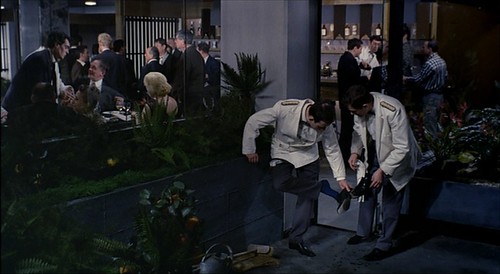

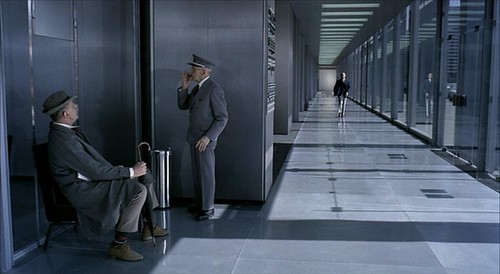
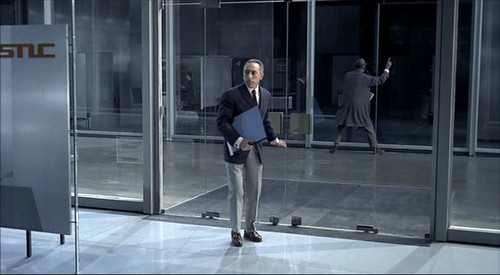


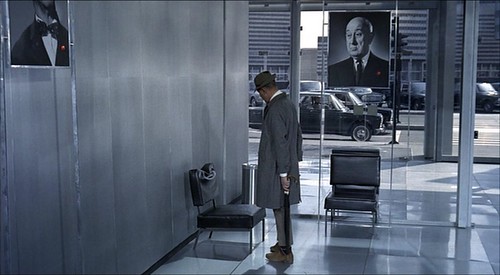
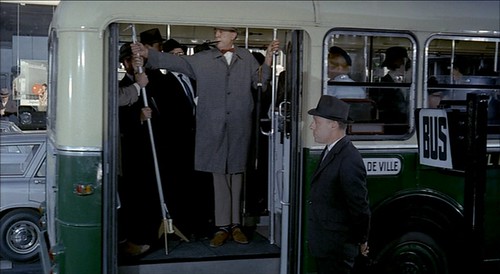
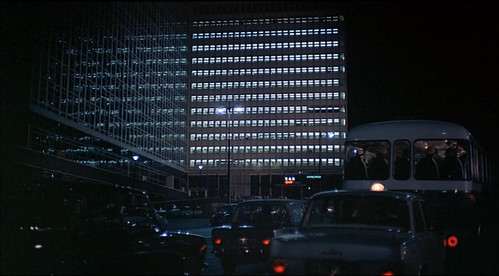


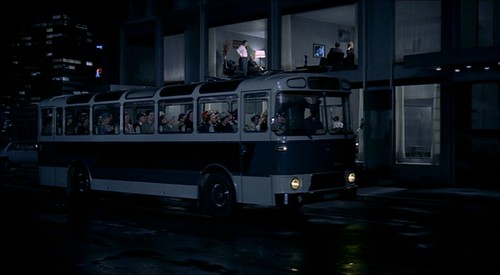
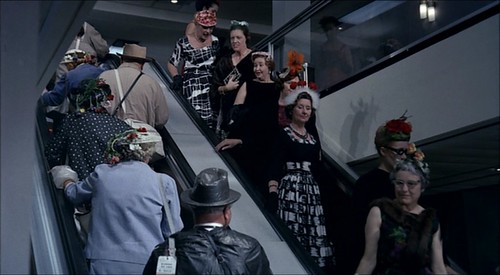
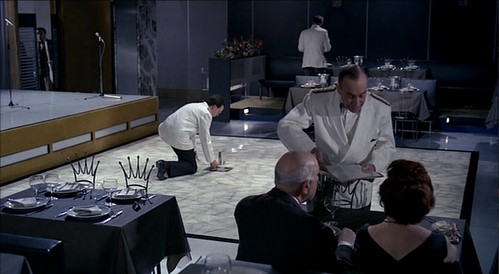
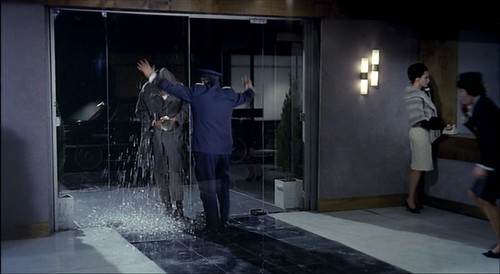
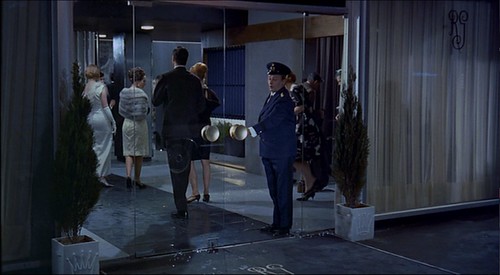
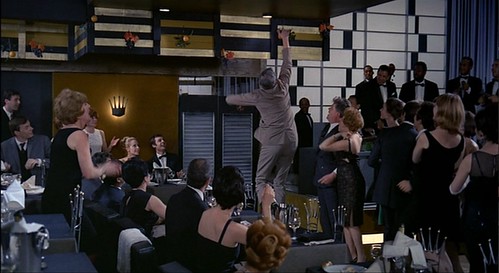
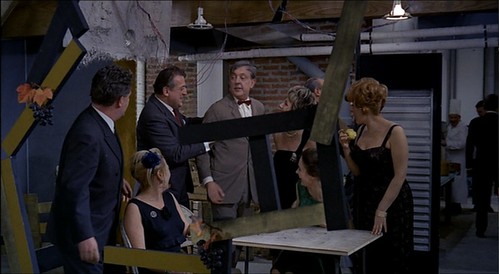
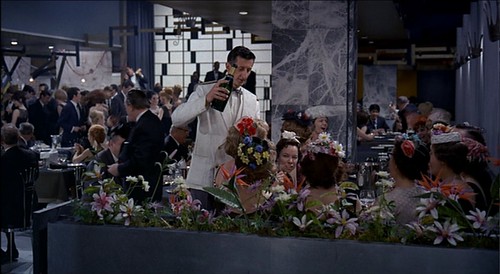
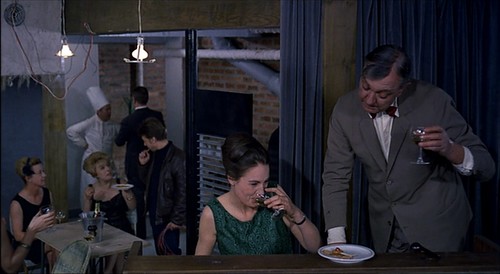
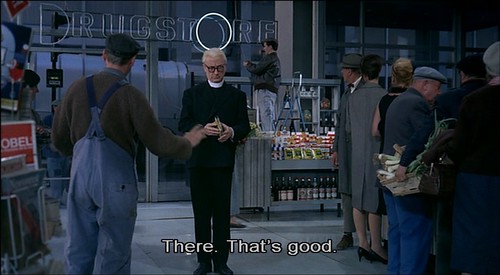
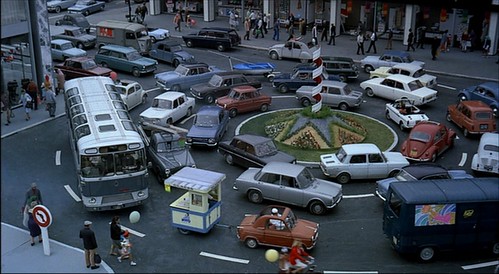
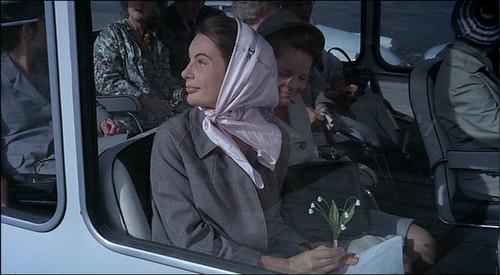

No comments:
Post a Comment